Portrait gallery
Pictures of elders in Kwahu-Tafo, Ghana, who shared with me the pleasures and worries of their lives. This gallery pays tribute to them.
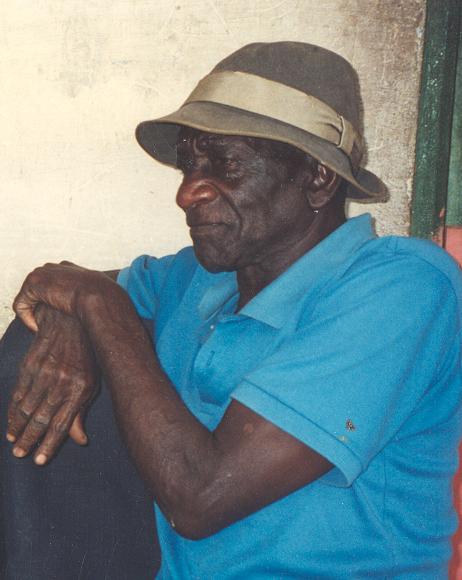 |
Òkyeame Kwame Opoku was born in Kwahu-Tafo in 1919. He settled as a tailor in Nsawam and later in Konongo. He then stopped his work as a tailor and opened a store in Nkawkaw. His business was successful. He started a cocoa farm. During that period he was also buying and selling cocoa. He married three times and had sixteen children, all of whom he was able to send to school, although he himself hardly attended school. Kwame Opoku had been an òkyeame (‘linguist’) at the chief’s palace for about thirty years. His work as an òkyeame had opened his mind and broadened his knowledge on a lot of customary and legal matters. Many people visited him in his old age to ask his advice. He has been my most eloquent and insightful 'informant' about the experience of growing old in Kwahu-Tafo. His voice is present in nearly all my publications on older people in Ghana. [pdf] [pdf] [pdf] His remarks about respect, friendship and death are the most touching contributions in our book on "Life, Love & Death." He died on March 17th 2002 and was buried on the 27th of April of that year.
|
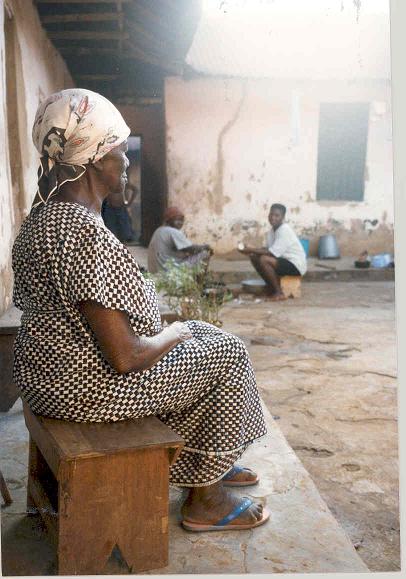 |
Nana Yaa Amponsaa was born in 1905 in Kwahu-Nkwatia where her mother married a man from Kwahu-Tafo. She came with her mother to Kwahu-Tafo and stayed there during her youth. When she grew up she started farming and later on became a trader. She married three times and then decided not to marry any more. She continued going to farm till a very old age. She had five children, three of whom are still alive. She herself did not attend school, but she managed to send all of her children to school. On the 30th of March 2001 she died peacefully. Her children estimated her age to be 113, but we believe she was about 95. She was buried on 7th July 2001.
|
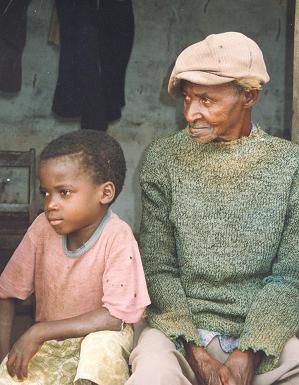 |
Nana Kwaku Agyei was born in Kwahu-Tafo. He married twice and had four children, one of which died early. He was a farmer, a palm wine tapper, a hunter, a herbalist and an attendant at the chief’s palace. He beat the ‘gong-gong’ in town and rendered all kinds of services at the chief’s court. He was witty and impressed people with his knowledge of proverbs. Nana Agyei is the main character in my article on the ideas and ideals of the respected elder in Akan society [pdf]. During his old age Nana Agyei was a poor man.The last months of his life he was more comfortable as he stayed with two of his sisters in a new house built by his nephew. He died on the 17th of January 1995. |
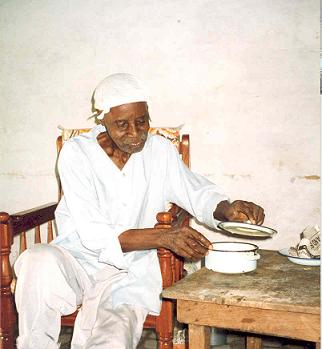 |
Agya Kwame Mensah was a tall man who claimed to be 99 years old. He had worked as a sawyer in the lumber industry. When I met him he was blind. His daughter was looking after him. He died in 1996. |
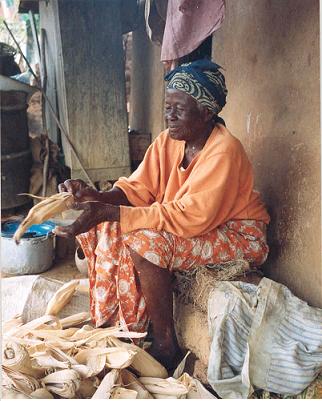 |
This picture shows Nana Akua Mansah in her characteristic position, between the corn leaves. Her daughter used the leaves to wrap the kenkey (food made of corn), which she sold to schoolchildren. Till her death in 1998 Akua Mansah tried to be useful in the house. |
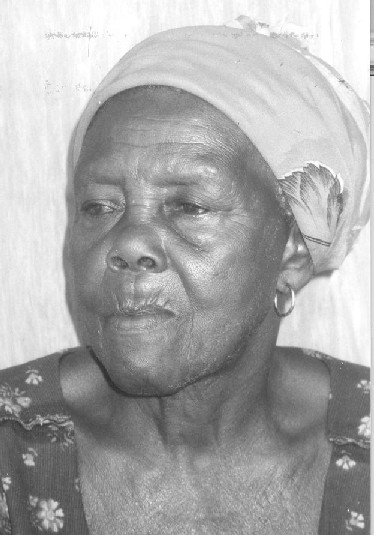 |
Nana Mary Dedaa was born in Kwahu-Tafo and spent most of her youth with her father who was farming in a village, now covered by the Volta Lake. She married three times and had ten children, five from the first and five from the second husband. During her old age she was still very active, selling things, doing chores in the house and visiting friends and relatives. In 1999 she paid a visit to her son in Nkawkaw where she fell sick and died. Her body was brought to Kwahu-Tafo and buried there. She is the main character in my 2007 article “It is a tiresome work.” Love and sex in the life of an elderly Kwahu woman. [pdf] |
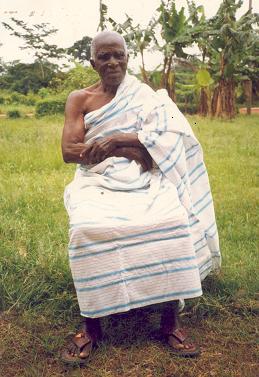 |
Elias Michael Kwame Frempong was born in 1906 at Kwahu-Tafo. He was the eldest of nine children. He started school at the age of 17 and completed his schooling when he was 21. Having been educated, he sent all his children and nephews to school. In 1953 he travelled with seven others to the famous shrine of Kankan in Guinée to seek help to become successful in life. This journey, which made him pass through Mali and other countries, broadened his horizons and contributed to his philosophical outlook. I quoted him in many of my articles. [pdf] [pdf] (see also his contribution to the booklet "Life, Love & Death"). He went to Accra in 1956 to trade. When his mother died in 1958 he settled in Kwahu-Tafo. He married three times and had 15 children, 12 grandchildren and 63 great grand children. He died at the age of 90 on the 24th February 1996 at Atibie Government Hospital and was buried on the 23rd March 1996 in Kwahu-Tafo. His and his wife's funeral are described and discussed in an article on "dying peacefully" [pdf]
|
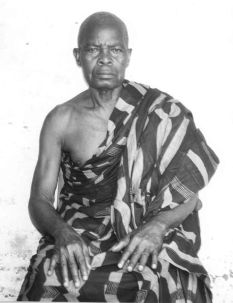 |
Nana Kwaku Nyame was born in Kwahu-Tafo around the year 1905. He was very small at his birth, so his parents feared that he would die. They said: “It is only God who can save him.” Two months later they realised that the child was going to live and they called him Nyame (God). Kwaku Nyame never went to school. He was a farmer throughout his life. The greatest shock in his life was the loss of his cocoa farm during the drought of 1984. He married five times and had seventeen children altogether, but only ten of them survived him. During the later years of his life Nana enjoyed a long stay in the house he himself had built in Kwahu-Tafo where he was surrounded by nieces, nephews and grandchildren. He enjoyed speaking to me about the building of his house and I have quoted him extensively in an article that focused on the house as a measure of successful ageing. [pdf]. Kwaku Nyame died on the 19th of April 2001 and was buried three days later. |
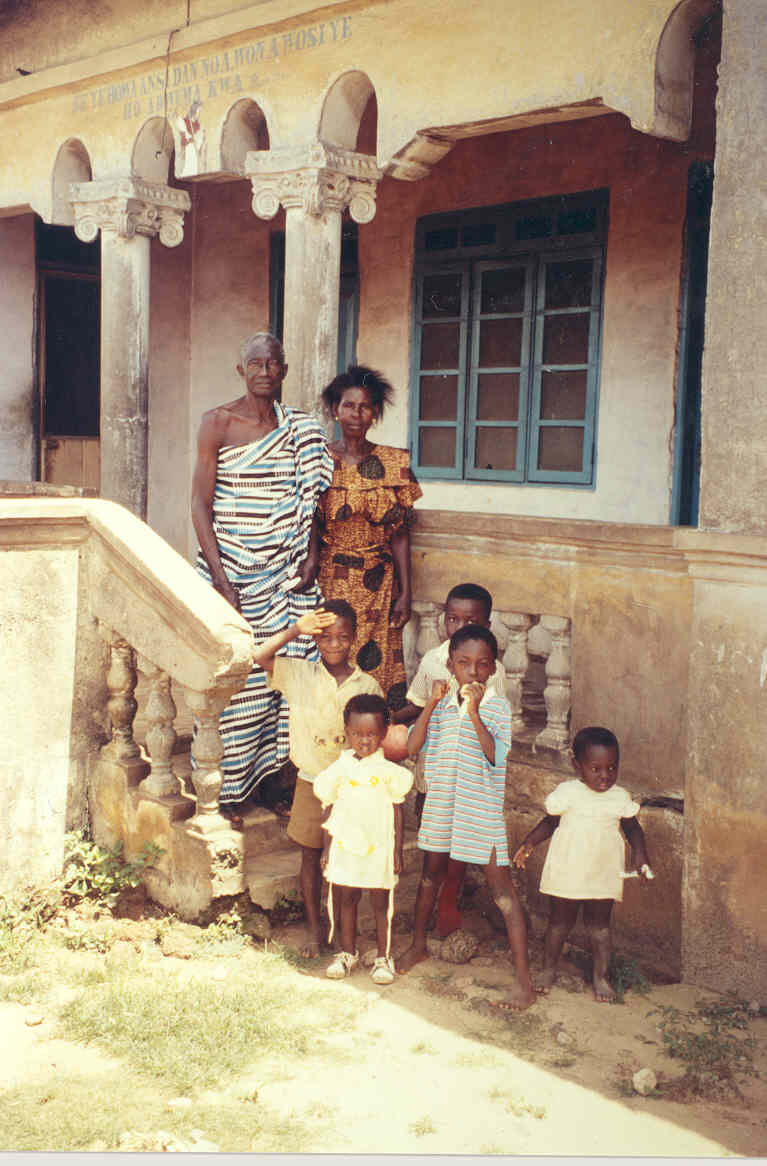 |
Òpanyin Kwabena Dadeè was one of the most successful elders in Kwahu-Tafo. He started his career as a sandal maker and became in the end a well-to-do cocoa farmer and trader. His house represents his success in life. Above the veranda he has written a psalm text in Twi: If the Lord does not build the house, the labourers toil in vain. He built in total six houses in Kwahu-Tafo, for his wife and his children and to let. After a life of hard work he enjoyed the love and care of his wife, his children and grandchildren. He figured in several of my articles as a model of the successful elder. [pdf] [pdf]. He died on the 18th August 2004 and was buried of the 6th November. His relatives made an extensive video coverage of the funeral ceremonies. |
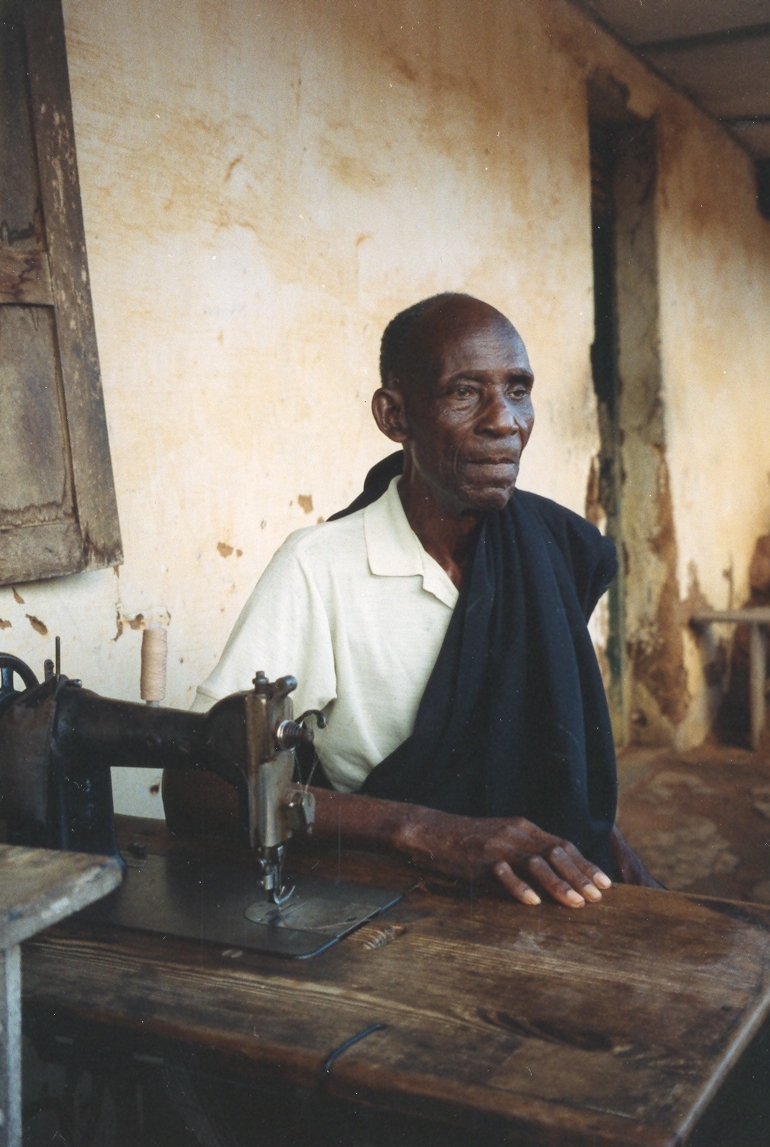 |
Nana Kwasi Antwi (a pseudonym) was a tailor who became famous for his speed. People gave him therefore the nickname "Five-Minutes-Batakari" [meaning that he could sew a Ghanaian smock within 5 minutes]. From the money he earned he was able to build his own house. He had seven children most of whom settled abroad. When I met him he was almost blind and unhappy. Old age was miserable, he said, because he could not work as before. Moreover, he was suspicious of the people staying with him in the house and complained about their behaviour towards him. I never fully understood his complaints but felt sorry for him that his successful life ended so sadly. He died in September 1994, less than five months after I got to know him. The family used this picture, showing him behind his sewing machine, during his funeral. |
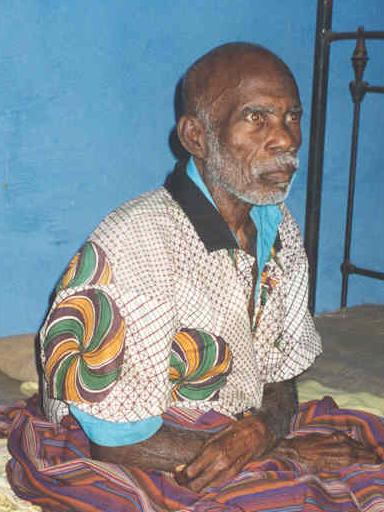 |
Òpanyin Kwaku Martin married five times in his life and had twenty children. All his children were living outside Kwahu-Tafo. He built a house in which he occupied one room when I met him. The other rooms - about six - were occupied by tenants. Kwaku Martin, who was one of the first to attend school in Kwahu Tafo, was a respected person during his active life but towards the end of his life his condition became miserable. He suffered a stroke from which he never fully recovered and became almost blind. His last wife suddenly died leaving him alone in a house full of tenants. One of my dearest memories of him is a lively and witty conversation with him and his friend Nana Asare about wisdom and witchcraft [pdf] |
 |
Nana Mercy Ofori was living with her son and his family in a mud house at the outskirts of Kwahu-Tafo. She was blind and had one leg amputated after an accident on the farm. She was surrounded by loving people but lived in extremely poor circumstances. |
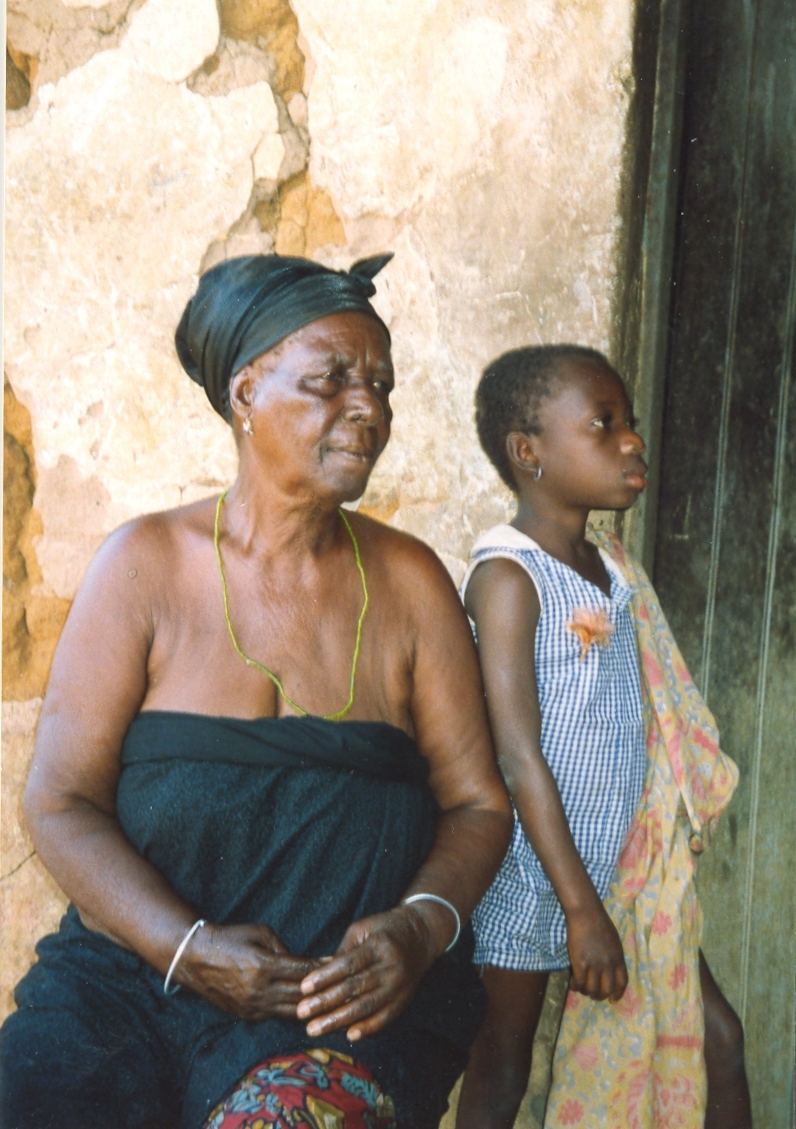 |
Nana Abena Ntiriwaa. We had five conversations with Nana Ntiriwa, but never asked her about her life history. When we visited her, she was always surrounded by some of her daughters and a lot of grandchildren. We talked about respect, poverty, love and death. One thing I remember most vividly was that she was worried that the poor state of her house would be a disgrace on the day of her funeral. She said she had asked her son to add at least two rooms to the house so that "when I die, there will be a place to lay me down." |
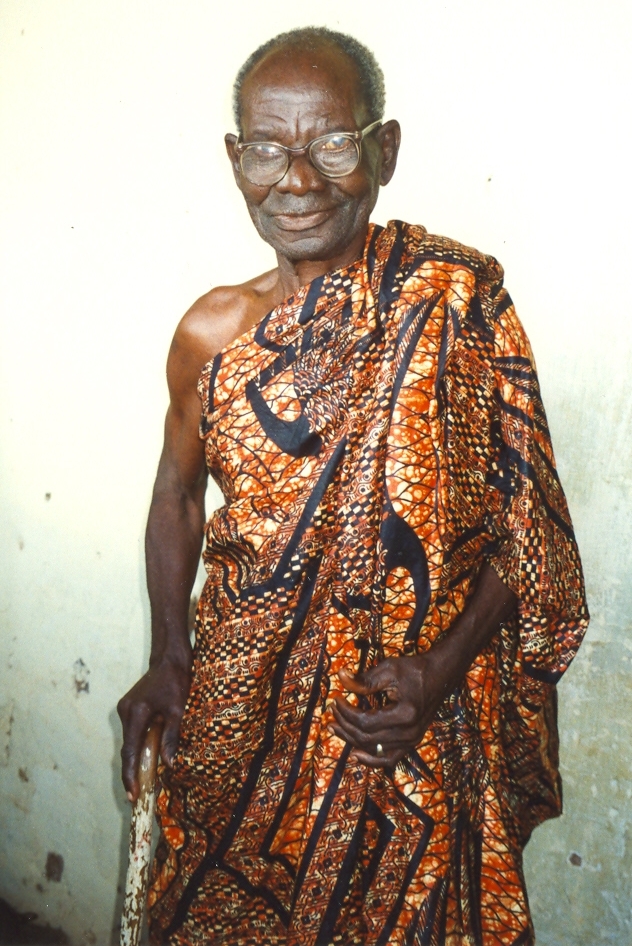 |
Òpanyin Kwame Posuo was a mason during his active life, but blindness forced him to stop the work. In 1995 he summarised the story of his life as follows: "I started school in 1930 in this town. In 1934 I went to class 4 at Mpraeso. After that I stopped school. I learnt to become a mason and after my apprenticeship I worked for some time in here in Kwahu-Tafo. I was later on employed by the Social Welfare Department as a mason and then by A.Lang, a construction company. I was with the company for some years but came home when my mother died about ten years ago. I married my present wife when I was still young. She is the only woman I have ever had. We had twelve children, but three of them died in their infancy. I sent all the remaining nine children to school. At present one of them is in the USA and one is teaching at a college in Accra. The first child is a painter at Nkawkaw. One of the girls is in Accra and another is in the Ivory Coast. Some are in the town here. After coming home from my travels I was doing masonry work. When I got trouble with my eyes, I had to stop work. Now I am no more able to work and it is my children who are taking care of me." He died on 28th of August 1997. |
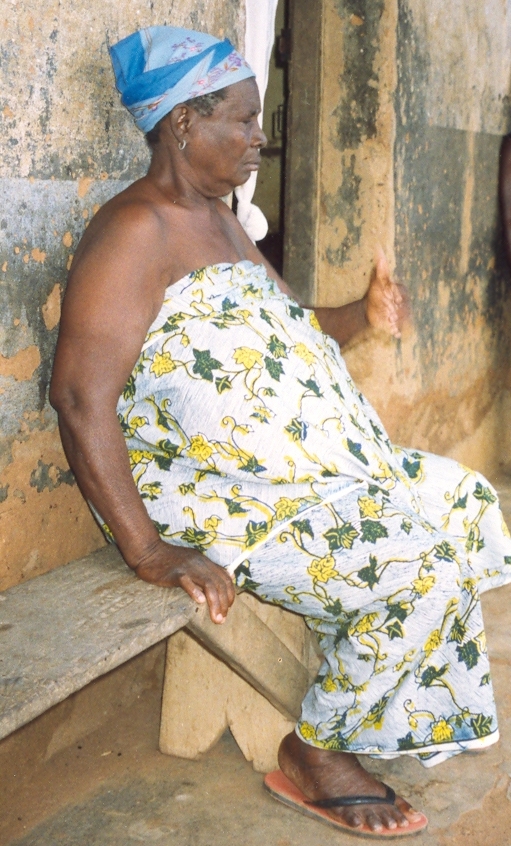 |
When we met Nana Adwoa Safowa in 1994 she was blind and staying with her sister-in-law who took care of her. Her husband was farming in the Afram Planes. Nana Safowa had thirteen children but four of them had died. Before the huisband started farming he had been a tailor in Kumasi. Her blindness worried her a lot: "I don't even see when my clothes are dirty." Two of my conversations with her are quoted in an article on the problems of hygiene for older people who have become dependent on others. [pdf] |
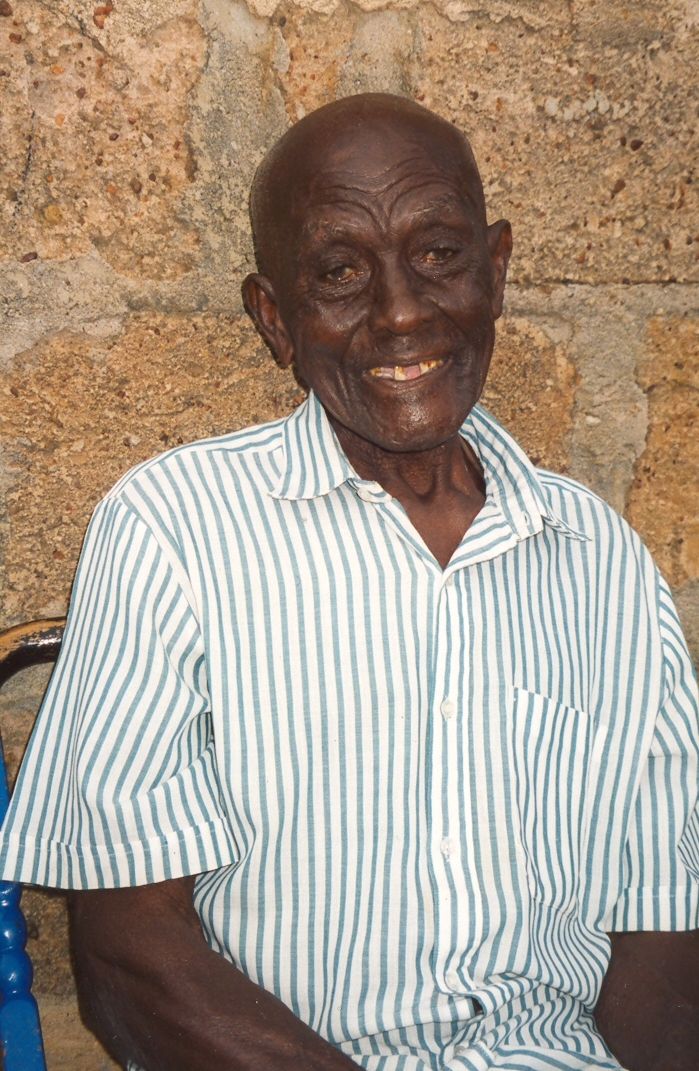 |
Wòfa Kwadwo Gyima was an elder in 'my' family. I got to know him in 1971 when I stayed in the house of his elder brother who was the abusua panyin (head) of the family. Kwadwo Gyima was then living in Accra earning a meagre income by sandal-making. When I met him again in 1994 he had returned to Kwahu-Tafo where he was a respected elder. In that period he spent most of the day at the site where his son was building a house and guarded the materials. During the last years of his life he became very close to me and revealed to me his worries about the young people who were not interested in the knowledge and wisdom of the elders. [pdf] He died in January 1996. |
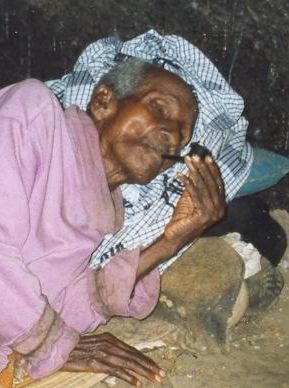 |
Agya Suo used to be a drummer at the shrine of Buruku, a local deity who is associated with a huge rock formation between Kwahu-Tafo and the Volta Lake. I have been told that he is an expert on traditional music and poetry, but little of that is left when I meet him for the first time. He lives in a empty (not one piece of furniture) room of a house on the premisses of the Buruku shrine. He is blind and shabbbily dressed. He spends the day sitting on the threshold of his room smoking a pipe. He asks me for shoes, clothes, food and tobacco. A woman who is distantly related to him gives him food. His bed is a mat on the cement floor. His wife left him when he fell sick. He complains that people are not interested in his stories. |
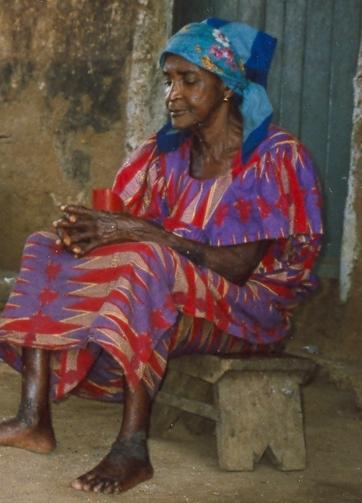 |
Nana Yaa Obusuo wat staying with her granddauther and some in-laws in a house of which several rooms had collapsed due to erosion. We only had one conversation with her. She was cheerful in spite of the hard conditions she was living in but also critical. When I asked her to compare the past and the present, she said: "There is hunger and no joy today; in the past things were cheap." |
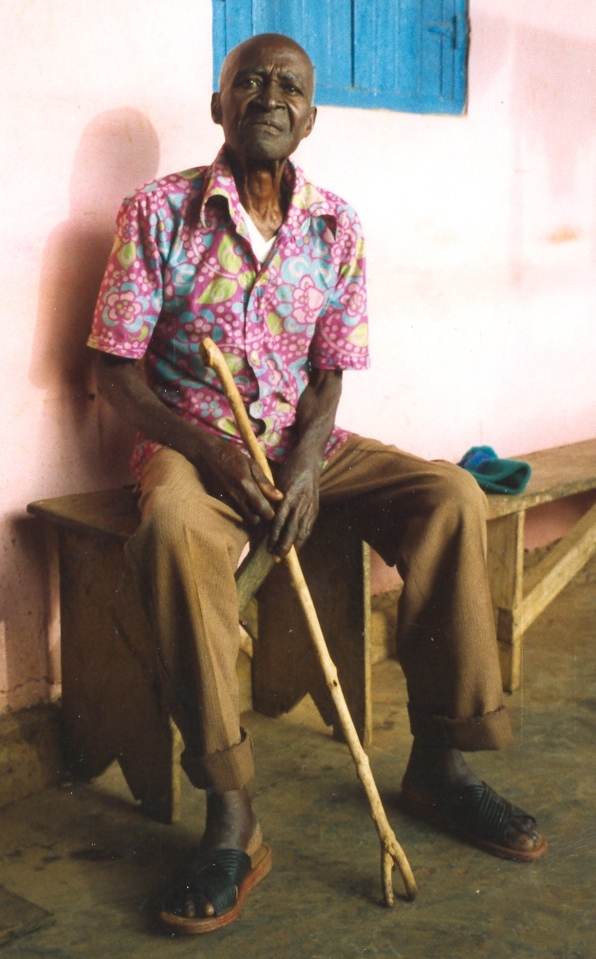 |
Wòfa Kwadwo Frimpong claimed that he was hundred when I first met him. He was an astute farmer and still went to farm almost every day in spite of his old age. One day I accompanied him to his farm which was about half an hour's walk from his house. His energy was indeed impressive. Another time I accompanied him to his church, the Assembies of God. When I asked him what he did not like of old age, he responded as I had expected: "I cannot carry goods as I used to and I cannot walk long distances. I get tired when I am working. I feel weak. You cannot do in your old age what you used to do in your youthful days." |
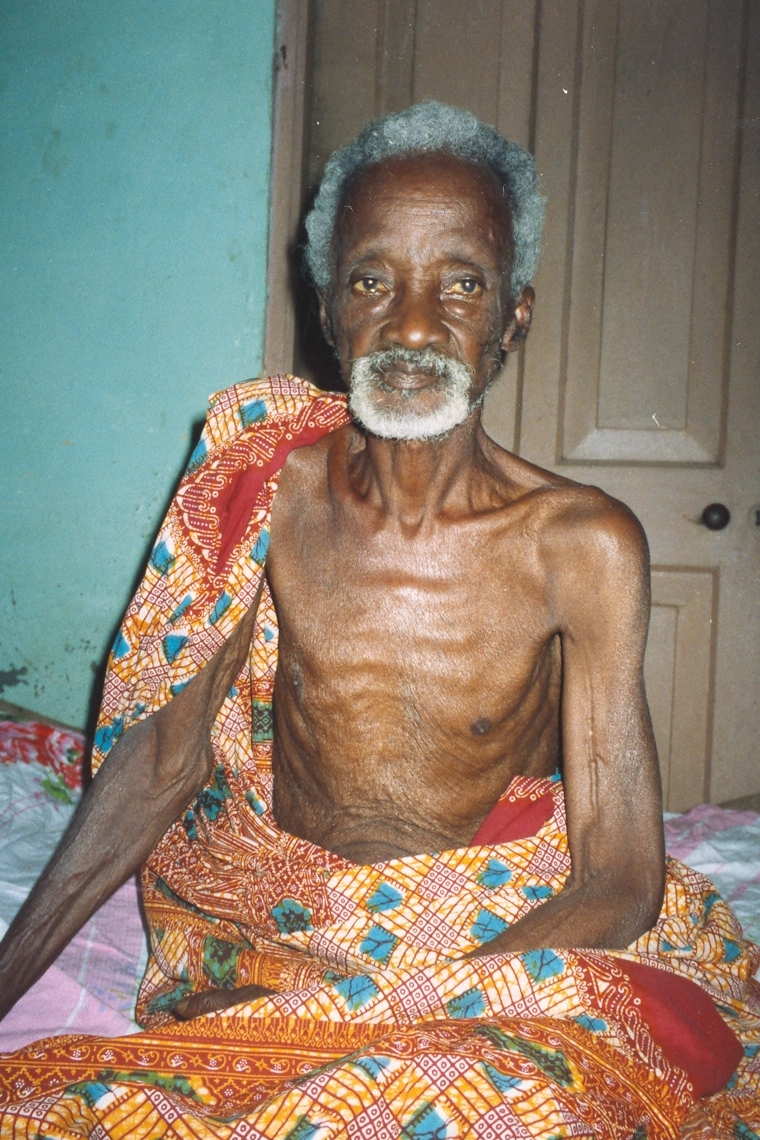 |
When I met Nana Kwasi Gyasi he was already sick and he died not long after our first meeting. In my 2002 article "Dying peacefully: Considering good death and bad death in Kwahu-Tafo, Ghana" I quote his daughter's respectful report of his death. [pdf]. Nana Gyasi had been a successful cocoa farmer. He lived in a beautiful house that he had built himself and that offered accomodation to a large number of relatives including nieces and nephews and grand nieces and nephews. He had built another house for his wives and own children. |
| Return to Home | |